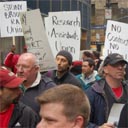In Defence of the Terror: Liberty or Death in the French Revolution by Sophie Wahnich, trans. David Fernbach Verso Books, 2012, 144 pp. If more people knew more about the French Revolution, their views could serve as a measure of …
I can’t speak for the tens of thousands of people who were hurt very badly by Hurricane Sandy and who are still in need, several months later, of a government that is big, strong, effective, and genuinely committed to the …
After November 6, 2012, the big sound rippling around the world was not a chorus of bipartisanship, not a whoop of euphoria, but a collective sigh of relief. Still, it must not be forgotten that nearly half of America’s voters …
Are young women in Japan on a wildcat baby strike? In 2005, for the first time since Japan began collecting population statistics in the late 1800s, the nation’s birth rate dropped below its death rate, marking a new low in …
Ryszard Kapuściński: A Life by Artur Domosławski Verso, 2012, 464 pp. Maybe it’s because Ryszard Kapuściński told so many stories about himself that little is actually known about him. We meet him in the alleyways of Dakar and the bazaars …
Hungary: Between Democracy and Authoritarianism by Paul Lendvai, trans. Keith Chester. Columbia University Press, 2012, 236 pp. In March 1990, I served as a member of an international team of observers to the first postcommunist elections in Hungary. It was …
This January marked the fortieth anniversary of the Roe v. Wade decision that legalized abortion in the United States. In ways not anticipated by the coalition of physicians and feminist health activists who fought to legalize abortion in the years …
Soon after Barack Obama won a second term with surprising ease, Pulitzer-Prize-winning artist Clay Bennett depicted a wealthy, white-haired man staring grimly at his television screen while around and behind him four servants, white and black, go about their jobs …
“Social relationships mirror wage relationships in structure and tone, but without the explicit clarity of a wage relationship”: a review of Arlie Russell Hochschild’s The Outsourced Self.

By working outside structures of power one may circumvent coercive systems but not necessarily subvert them. Localizing politics—stripping it of its larger institutional ambitions—has its advantages, but without a larger structural vision, it does not go far enough.

Given the level of alarmed debate and self-criticism in at least some major sectors of the Israeli press, the tsunami of vitriol that has descended on Peter Beinart and his book is fascinating, puzzling, and profoundly depressing.

Lawrence Summers’s celebration of the global reach of English can only be read as an unabashed apology for American empire. By even the most strategically hard-headed criteria, however, cadres drawn from a monolingual American elite are a poor choice as ambassadors of U.S. interests.

If graduate students like myself do not want to come into work one day to find ourselves replaced by video lectures delivered by “information curators,” we will have to learn to take collective action.

It is not just the economic climate in which our colleges and universities find themselves that determines what they charge and how they operate; it is their increasing corporatization.

When Mitt Romney urges Americans to “get as much education as they can afford,” or when university administrators call the police as their first response to student protest, it’s Ronald Reagan’s playbook they’re working from.













